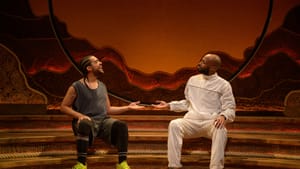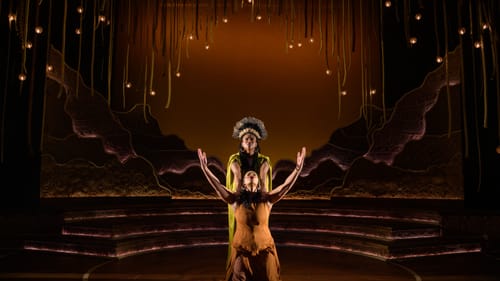Stay in the Loop
BSR publishes on a weekly schedule, with an email newsletter every Wednesday and Thursday morning. There’s no paywall, and subscribing is always free.
Art to guide us through a violent political reality
Wilma Theater presents Inua Ellams’s The Half-God of Rainfall

The Half-God of Rainfall, an epic dramatic poem now onstage at the Wilma, follows Demi, a young man who is half Nigerian human and half Greek god. His powers afford him legendary talent at basketball, leading to a career in the NBA, but also bringing strife among mortals and the gods.
Nigerian-born author, poet, and playwright Inua Ellams weaves Demi’s competing identities on a backdrop of conflict between gods of different cultures. The white Greek god of thunder, Zeus, is Demi’s father and also a conqueror reviled by the Yoruba god of thunder, Sàngó, and mortals alike.
Director Lindsay Smiling’s production balances beauty and playfulness while also exploring masculinity in crisis, fractured identities, intergenerational trauma, and the unfair burden on women to maintain strength and dignity amid the cruelties foisted on them.
The show’s parallels to real-life social issues are clear. It comments on the experiences of people born into mixed cultural identities by collaging imagery from Yoruba and Greek myth, the frenzy of Michael Jordan-era professional basketball, and other contemporary pop culture. Demi (Anthony Martinez-Briggs) finds both joy and pain as he adjusts to his celebrity life in the United States, in a potential evocation of Nigerian Greek NBA star Giannis Antetokounmpo. There is an unambiguous demonstration of white colonial violence in Zeus’s assault of Modúpe (Jessica Johnson), Demi’s mother.
Transformation and satisfaction
Johnson deserves particular praise as Modúpe, playing a mighty transformation from a scarred, lost woman into one whose fury elevates her to the status of a god. Johnson’s performance is grounded and raw, a beacon of emotion in the flurry of headier scenes. Martinez-Briggs brings puckish exuberance to their portrayal of Demi, playing the character’s inexperience with tragic pathos. But this is a true ensemble show; the performances interlock and uplift each other, as scenes progress with breathless energy. Each actor—cast from the Wilma’s HotHouse Acting Company—plays a crucial role in the collective.

Based on the heavy subject matter, it might seem that The Half-God of Rainfall would be a dour viewing experience, but Smiling achieves tonal balance here in his Wilma directorial debut (he is one of the company’s three co-artistic directors). While the production tackles big issues, Smiling and his ensemble give equal care to choreographed basketball scenes, big combat sequences, and a deeply satisfying revenge plot that finds Modúpe going to war with Zeus.
All the while, the production takes great care with its design elements. In scenes involving the gods, lighting by Thom Weaver and sound by Jordan McCree combine to rattle the room with thunder and color. Original music by McCree and co-composer Elle.Morris stitches scenes together, bridging corporeal gaps between characters. Dahlia Al-Habieli’s set design is elegant, giving the ensemble a large, earthy canvas on which to paint with their performances.
Guidance through art
Half-God does not shy away from its aesthetics and emotional core, but it is ultimately a play that invites its audiences to use their heads, too. Most of the story unfolds via direct address as if imploring us to allow emotion to be a catalyst rather than the story’s main takeaway. Considering the Wilma’s partnership with the Masculinity Action Project, as well as the ensemble’s call for audiences to continue the conversation after we leave the theater, it makes sense that the show sometimes seems to hold us at arm’s length, inviting us to take our own action.
As we continue to stumble face-first into an increasingly violent political reality, we will look to art for guidance. Works like The Half-God of Rainfall play a crucial role here: it does not promise us answers or comfort, but neither does it condemn us. It allows us the splendor of well-made theater while challenging us to expand our notions of what “well-made” entails. We leave with a clearer understanding of cultural violence, and an invitation—an empowering one, if you ask me—to heal and rectify together.
Know before you go: The Half-God of Rainfall includes haze, flashing lights, loud sounds, and depictions of sexual and physical violence.
What, When, Where
The Half-God of Rainfall. By Inua Ellams, directed by Lindsay Smiling. $35-$75 ($20 for students and industry). Through March 2, 2025, at the Wilma Theater, 265 S Broad Street, Philadelphia. (215) 546-7824 or wilmatheater.org.
Accessibility
The Wilma is a wheelchair-accessible venue with gender-neutral bathrooms. There will be open-captioned performances of The Half-God of Rainfall on Saturday, March 1, at 8pm and Sunday, March 2, at 2pm, and an audio-described performance on Sunday, March 2, at 2pm. For more info, visit the Wilma’s accessibility page.
Sign up for our newsletter
All of the week's new articles, all in one place. Sign up for the free weekly BSR newsletters, and don't miss a conversation.
